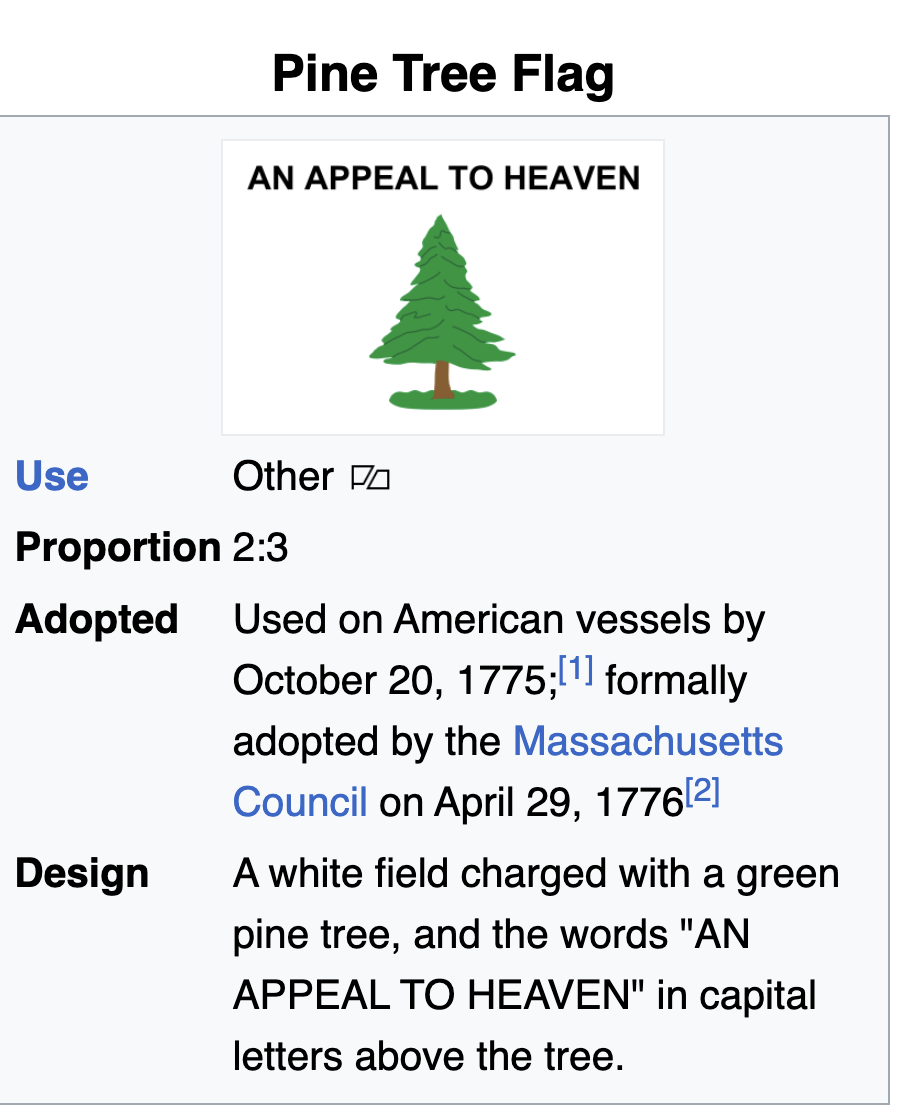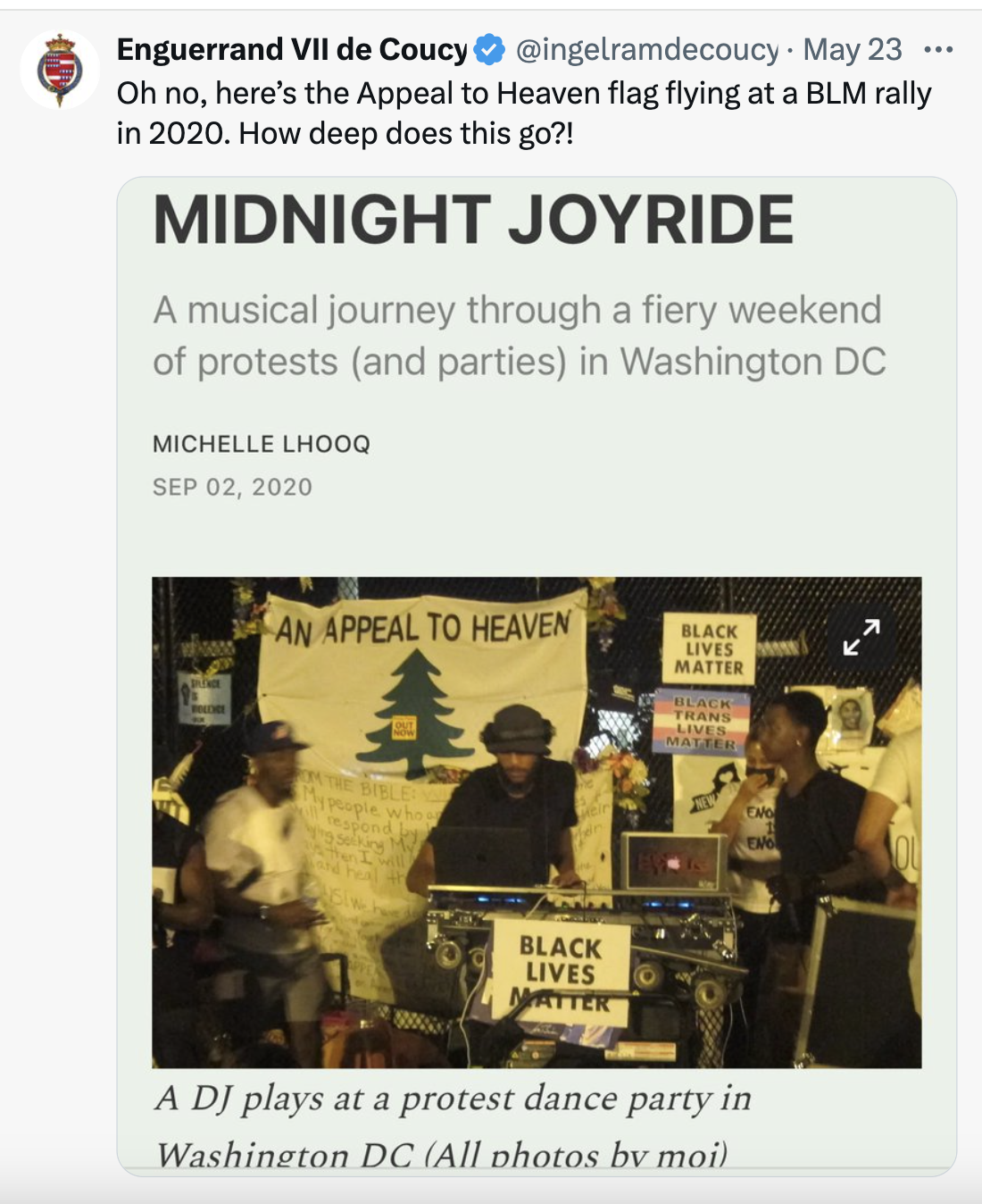More on our vigilant citizen patrols
/Scoop: Leonard Leo Caught Flying 'Appeal to Heaven' Flag
We know from MSNBC that "a Christian nationalist flag has been flown by Supreme Court Justice Sam Alito, right-wing activist Leonard Leo, and evangelical extremist House Speaker Mike Johnson." The Alito flag was flying last summer, but it's topping the headlines now as the media ensures we all know the flag is flown by MAGA insurrectionists.
We told you Christian nationalism was going to be the next white supremacy — it's the biggest threat to our democracy.
Leo was the longtime president of the Federalist Society. ProPublica ran a story in October called, "We Don’t Talk About Leonard: The Man Behind the Right’s Supreme Court Supermajority." And now, thanks to a tip from a "nearby resident," ProPublica has discovered the "Appeal to Heaven" flag flying outside of Leo's home in Maine. It sounds like Leo's neighbors are as unhinged as Alito's.
It's not just Justice Alito.
— Andy Kroll (@AndyKroll) May 23, 2024
Here's the "Appeal to Heaven" flag flying outside of conservative powerbroker Leonard Leo's home in Maine.
Photo taken by a nearby resident who shared it with @ProPublica and gave us permission to publish it. 1/x pic.twitter.com/dmwRAvNkMM
Leonard’s been the target of angry Maine (and visiting) loonies since he bought a house on Mount Desert Island back in 2018, and their ire only increased when the Dobbs decision came down — Leonard’s a Catholic, and unlike the guy in the White House who also claims membership in the Mackerel Snapper branch of Christianity, he opposes abortions.
.So, what’s the story behind this flag?
Perhaps surprisingly, Wikipedia offers an objective article on its history and use
The Pine Tree Flag (or the An Appeal to Heaven Flag) was one of the flags used during the American Revolution. The flag, which featured a pine tree with the motto "An Appeal to Heaven", or less frequently "An Appeal to God", was used by a squadron of six schooners commissioned under George Washington's authority as commander-in-chief of the Continental Army beginning in October 1775.
The pine tree is a traditional symbol of New England. The phrase "appeal to heaven" appears in John Locke's Second Treatise on Government, where it is used to describe the right of revolution.
The flag is the official maritime ensign for the Commonwealth of Massachusetts, though the script was removed in 1971. It was used by state navy vessels in addition to privateers sailing from Massachusetts.[3]
The phrase "Appeal to Heaven" is a particular expression of the right of revolution used by British philosopher John Locke in his Second Treatise on Government. The work was published in 1690 and refuted the theory of the divine right of kings. In chapter 14:[6]
And where the body of the people, or any single man, is deprived of their right, or is under the exercise of a power without right, and have no appeal on earth, then they have a liberty to appeal to heaven, whenever they judge the cause of sufficient moment. And therefore, though the people cannot be judge, so as to have, by the constitution of that society, any superior power, to determine and give effective sentence in the case; yet they have, by a law antecedent and paramount to all positive laws of men, reserved that ultimate determination to themselves which belongs to all mankind, where there lies no appeal on earth, viz. to judge, whether they have just cause to make their appeal to heaven.[7]
Appeal to Heaven and Locke
Locke's enlightenment-age works on the topic of the philosophy of government were well-known and frequently quoted by colonial leaders in the 1760–1776 period prior to American independence. Locke's writing that most influenced the American philosophy of government was his Two Treatises of Government, and has been used to defend the secularization of American political structures.[8] Richard Henry Lee, a signer of the Declaration of Independence, saw the Declaration as being copied from that work. Locke was not only one of the most-cited political philosophers during the Founding Era (~1776 to 1779), but also the single most frequently-cited source in the years from 1760 to 1776 (the period leading up to the Declaration of Independence).[9]
Prior to Colonel Reed's suggestion and Massachusetts General Court establishing the Pine Tree flag as the standard of the Massachusetts navy, "an appeal to Heaven" or similar expressions had been invoked by the Massachusetts Provincial Congress in several resolutions, Patrick Henry in his Liberty or Death speech, and the Second Continental Congress in the Declaration of the Causes and Necessity of Taking Up Arms. Subsequently, the phrase was used again by the Second Continental Congress in the Declaration of Independence.
And this is a nice comment to the Xr’s post:



